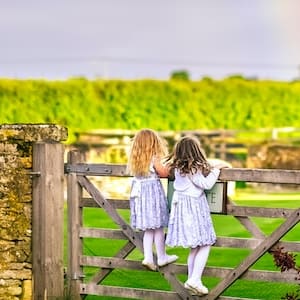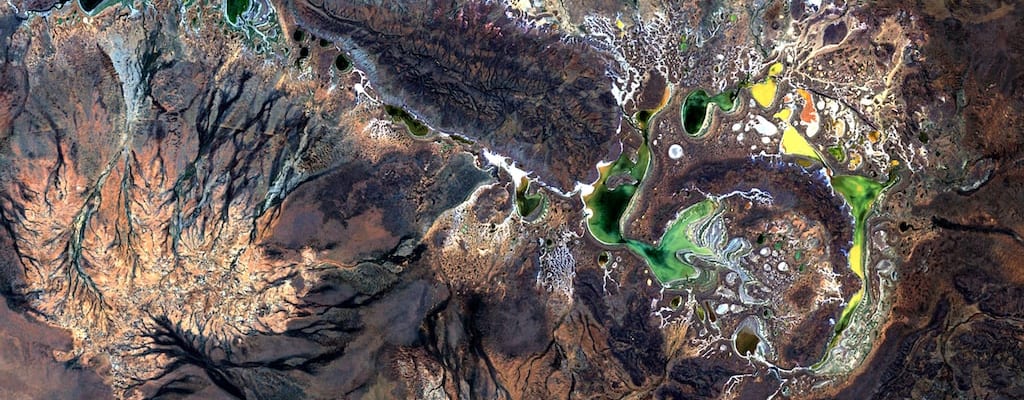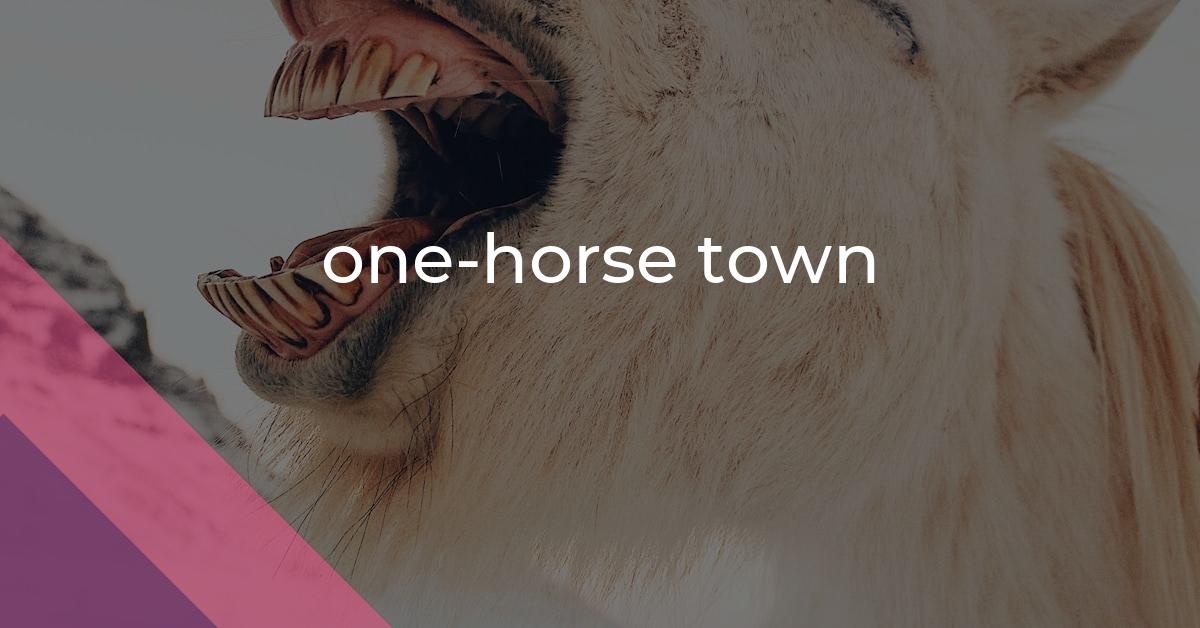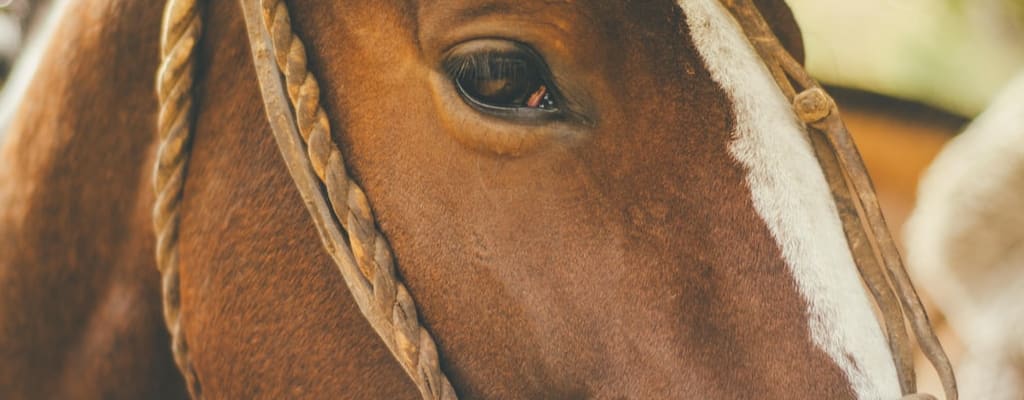one-horse town: Idiom Meaning and Origin
What does ‘one-horse town’ mean?
The idiom "one-horse town" refers to a small and unimportant place, typically lacking excitement or opportunities. It conveys a sense of boredom, insignificance, and limited resources within the town.

Idiom Explorer
An idiom widely used to refer to something insignificant or unimportant. It implies that the mentioned object or amount is of little value or significance.
The idiom "pony in the barn" means having something valuable or desirable that is not being used or shown off. It reflects the idea of keeping a pony hidden away in a barn instead of riding it or displaying it for others.
The idiom "one-off" refers to something that happens or is done only once, and is not repeated or meant to be continuous.
"One-note" as an idiom refers to someone or something that is limited in their abilities or characteristics, lacking variety or depth. It implies a lack of range or flexibility, often used to describe a person who has a single focus or interest.
The idiomatic expression "one-horse race" refers to a competition or contest in which the outcome is completely predetermined, usually due to the overwhelming superiority of one participant.
The idiom *one and the same* means that two or more things or people are identical or indistinguishable from each other.
The idiom "one and only" means the unique or singular example of something or someone. It emphasizes that there is no other comparable or similar entity.
The idiom "one and all" means every single person or thing, without exception.
The idiom *old hat* means something that is old-fashioned, outdated, or no longer interesting or impressive. It refers to a hat that is no longer trendy or fashionable, suggesting that something has become clichéd or overused.
The idiom "old as the hills" refers to something that is extremely old, often implying that it has been around for a very long time and is therefore considered outdated or out of touch with current trends or ideas.
Decoding Solitude in a One-Horse Town
The idiom "one-horse race" is closely related to the expression "one-horse town." A one-horse race refers to a competition or contest in which only one participant or one side has a chance of winning. It is a race that lacks excitement or suspense because the outcome is already predetermined. Just like a one-horse town, a one-horse race implies insignificance and lack of competition. Both idioms convey a sense of dullness and unimportance.
On the other hand, the expression "no horse in this race" is the opposite of a one-horse race. It means being uninvolved or having no stake or interest in a particular matter or situation. It suggests that someone is impartial and does not have a personal investment or agenda. In the context of a one-horse town, the idea of having no horse in this race could mean that the person is not affected or concerned about the insignificance or lack of opportunities in such a place.
Another related idiom is "small change," which refers to a trivial amount of money or something of little value or significance. It can be used metaphorically to describe something or someone as unimportant or inconsequential. In the context of a one-horse town, the notion of small change can be applied to highlight the lack of economic opportunities or the limited value attributed to such a place. It suggests that the town has little to offer in terms of financial prosperity or development.
One-horse race, no horse in this race, and small change are all idiomatic expressions that share a common theme of insignificance and lack of excitement or importance. They can be used to enhance the understanding and description of a one-horse town, emphasizing its uninteresting nature and limited opportunities.
A one-horse town is commonly used in American English to describe a small, unimportant, and uninteresting place. The phrase originated in the United States during the 19th century and has since become a well-known expression. It is believed to have originated from the literal meaning of a town too small or unimportant to support a stagecoach line, hence needing only one horse for local transportation.
The idiom gained popularity during the heyday of horse-drawn transportation in the United States, especially in the western regions where small towns with limited resources were common. The phrase's association with one horse and limited transportation options contributed to its metaphorical use to describe a place or situation lacking excitement, activity, or significance.
Despite the negative connotation often associated with a one-horse town, the idiom can also be used nostalgically to refer to a simpler, slower-paced time. It evokes a sense of a bygone era when life was less hectic and communities were tightly-knit. This nostalgic aspect of the expression adds depth to its meaning and makes it more than just a derogatory term.
In modern usage, a one-horse town can also be applied to describe a place that lacks amenities, entertainment options, or economic opportunities. It implies that the town is small, remote, and isolated, with limited resources and few prospects for growth or development. The idiom encapsulates the idea of a place being off the beaten path or a backwater, away from the hustle and bustle of larger cities and urban centers.
The idiom has been widely used in literature, music, and popular culture. It can often be found in novels, songs, and movies to evoke a sense of dullness or insignificance. The image of a one-horse town conjures up a mental picture of a small, sleepy, and desolate place. This imagery contributes to the idiom's enduring popularity and its ability to capture the imagination of people.
Although the precise etymology of this idiom is unclear, its meaning and usage have remained consistent throughout the years. "One-horse town" is an idiom deeply rooted in American English, which symbolizes the notion of a small, unimportant place. Its origins can be traced back to the era of horse-drawn transportation, and it has become a commonly used phrase in literature and popular culture.
Despite its negative connotation, the idiom can also evoke a sense of nostalgia. As language continues to evolve, this idiom remains relevant in describing places lacking activity, significance, or opportunities. A one-horse town is not just a physical location, but a representation of a certain way of life, a glimpse into the past, and a reminder of the importance of community and connection. It serves as a reminder that sometimes, it's the small, seemingly insignificant places that hold the most charm and meaning.
Example usage
Examples of how the idiom "one-horse town" can be used in a sentence:
- He moved to a small one-horse town in the countryside to escape the hustle and bustle of city life.
- The restaurant in that one-horse town serves the best apple pie you'll ever taste.
- She couldn't wait to leave the one-horse town she grew up in and explore the opportunities of the big city.
More "Geography" idioms



